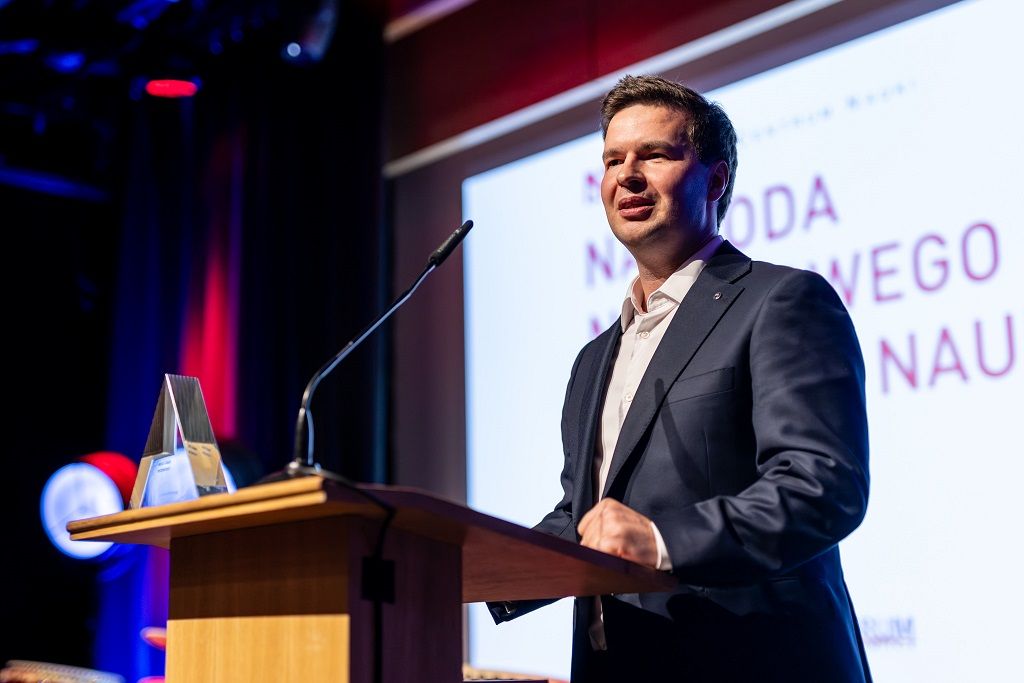Guests on the latest episode of the NCN podcast are Prof. Joanna Golińska-Pilarek, member of the NCN Council, and Prof. Wiktor Lewandowski one of the winners of this year’s award.
Wiktor Lewandowski, Marcin Magierowski and Błażej Skrzypulec received the NCN 2024 Award for their outstanding scientific achievements. The award is presented to researchers of the younger generation working in Polish scientific centres. The ceremony took place on 9 October in Kraków.
Błażej Skrzypulec received the NCN Award for Structural Aspects of Perceptual Experience. The title of Marcin Magierowski’s achievement is “carbon monoxide and hydrogen sulphide as key signal transducers in the pathogenesis and pharmacology of gastrointestinal lesions”. Wiktor Lewandowski earned the award for his ground-breaking technique in producing chiral photonic nanomaterials.
In the latest episode of the NCN podcast, Joanna Golińska-Pilarek, a
 prof. Wiktor Lewandowski
member of the NCN Council and the jury selecting the Award winners, Wiktor Lewandowski and Anna Korzekwa-Józefowicz discuss the research of the award recipients, the state of scientific research in Poland, and the jury’s decision-making process.
prof. Wiktor Lewandowski
member of the NCN Council and the jury selecting the Award winners, Wiktor Lewandowski and Anna Korzekwa-Józefowicz discuss the research of the award recipients, the state of scientific research in Poland, and the jury’s decision-making process.
“All the people shortlisted for the NCN Award this year had a very good track record, and this has varied in previous years. These were people who had great publications, were extremely scientifically active, had grants, various other scientific activities. However, what really matters is what’s behind these publications and activities. What I am looking for, and I think most members of the jury are looking for, is a scientific discovery, a breakthrough, a significant insight that contributes to our understanding of the world. Around this, around the stature, the importance, the significance of the achievement are the discussions at the jury meeting”, says Joanna Golińska-Pilarek.
This year, 150 candidates were submitted for the Award. The number of applications was more than three times that of 2023. Joanna Golińska-Pilarek points out, however, that not all applications truly highlighted the candidates’ achievements. “It is customary in the Polish scientific community to look at scientific achievement through the prism of various types of metrics, even though we dislike them very much, we constantly refer to them, i.e. the number of publications, the number of grants, citations. The problem in many applications was that the description of the achievement just boiled down to this. I mean, you could find out what a person was doing, where he or she had published work, whereas there was not even a sentence about what, what the candidate had achieved as part of this research, that was incredibly surprising to me”, he says.
“Unusually fortunate”
Together with his team, Wiktor Lewandowski is creating materials whose building block dimensions are counted in nanometres. “We design and synthesise organic-inorganic components whose unique feature is their ability to order themselves spontaneously at the nanoscale. Our main achievement was to obtain spring-like nanomaterials with controlled torsion that interacted strongly with circularly polarised light. These innovative materials not only impress with their ordered structure, but also open the door to future technologies for faster data transfer or advanced 3D imaging”, says the researcher.
When asked about his working conditions, he replies that he is “unusually fortunate”. “I found myself in a very good place, a great environment, with good equipment facilities, and I found myself in a period in Polish science that was conducive to the development of Polish researchers, a period in which the National Science Centre was already operating”, says the researcher. He adds that researchers currently face many challenges. “These are, of course, on the one hand scientific, purely intellectual challenges. They involve encouraging younger team members to work in a particular subject, so that they want to stay at a university or a particular research unit, so that they do not leave for industry. It is also a question of infrastructure availability. I didn’t miss anything along the way. However, the availability of equipment or support from people who have much more international experience, experience in winning grants, are definitely elements that should be available to every young researcher”, he says.
You can listen to the podcast on Spotify and Apple Podcast
